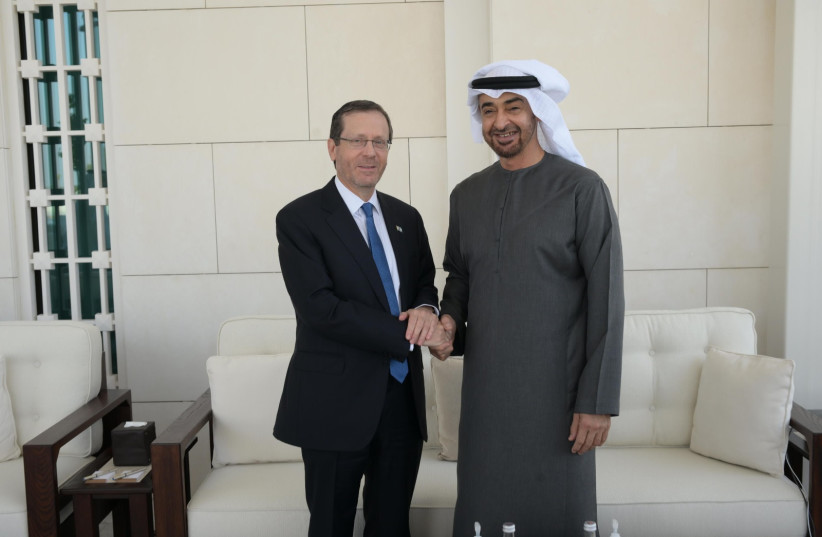Amid the turmoil over the burgeoning coalition, the ongoing spate of terrorist attacks on Israelis and the country’s economic woes, it’s easy to overlook that we’re living in pretty remarkable times.
The president of Israel, Isaac Herzog, received a red-carpet reception on Sunday in Manama, Bahrain. The Israeli flag waved next to the Bahraini flag as an honor guard played Israel’s national anthem, “Hatikvah,” and Bahrain’s anthem, “Bahrainona.”
Who would have thought just three years ago that such a momentous occasion would take place? The Abraham Accords have changed the face of the region in which Israel is situated. What happened on Sunday, when Herzog made the first visit by an Israeli president to Bahrain, should not be taken for granted or treated with a cynical shrug.
A historic step in the Israel-Arab relationship
Herzog described the visit as “another historic step in the relationship between Israel” and Arab signatories to the Abraham Accords.”
King Hamad bin Isa Al Khalifa doubled down on Herzog’s statements, saying, “We are confident that this visit has an important role in consolidating relations between our two countries.”

The Jerusalem Post’s Tovah Lazaroff, who is accompanying Herzog on the visit – which moved on to the United Arab Emirates on Monday – wrote, “The pomp and ceremony of Herzog’s very public trip underscored the extent to which relations with Israel have become normalized in some Arab countries that are Westernizing and seeking to vastly expand their economic horizons.”
As the Abraham Accords mark their second birthday (with the series of treaties normalizing diplomatic relations between Israel, the UAE, Bahrain, Sudan and Morocco taking place between August and December 2020), the number of visits and high-level meetings between Israel and Abraham Accords countries is rising.
The Made for Trade Live event, which showcased Israel-UAE business ties last week, and the UAE National Day celebrations at the UAE Embassy in Tel Aviv last week illustrate the success of the Accords, the Post’s Seth Frantzman pointed out on Sunday.
However, along with the flourishing ties, business opportunities and people-to-people connections, there’s an elephant in the room that shadows the festivities: Progress in resolving the Israeli-Palestinian conflict.
The Palestinian elephant in the room
Bahrain’s Foreign Minister Abdullatif bin Rashid Al Zayani said as much speaking to reporters Sunday night, saying the Abraham Accords will ultimately only succeed if a two-state resolution to the conflict is achieved.
Hamad also made sure to speak of the Palestinians in his public remarks at the start of his meeting with Herzog. There is firm support in Bahrain for “achieving a just, comprehensive and sustainable peace that guarantees the legitimate rights of the Palestinian people and that will lead to stability, development and prosperity for both the Palestinian and Israeli people as well as for the people of the region,” Hamad said.
The incoming Israeli government needs to take those words seriously. The status quo of continued terrorist attacks on Israelis, as well as Palestinians acting against Israel being shot by security forces on an almost daily basis, might be manageable on a military basis, but it is unsustainable for the long-term stability and future of the Israeli and Palestinian people.
The Palestinian issue is likely to be number 999 on the to-do list of the Benjamin Netanyahu-led coalition, due to the obvious reasons of the coalition partners having no interest in pursuing any kind of negotiations with the Palestinian Authority.
Granted, during both Naftali Bennett and Yair Lapid’s tenures there was little to no movement with the Palestinians, with the strategy seeming to punt the issue down the field for later.
That’s likely what the Biden administration surmised as well, knowing the tenuous makeup of the “change” government in which there was no consensus for engagement with the Palestinians.
With the likely new government, there will be a consensus, and it will not be about jump-starting negotiations about a two-state solution. It’s unclear if US President Joe Biden will push back now that Netanyahu is back in power.
Even if he doesn’t, it behooves Netanyahu to take the Bahraini comments to heart. Taking the Abraham Accords for granted, and ignoring the Palestinian issue, will only come back to hurt Israel in the end.
